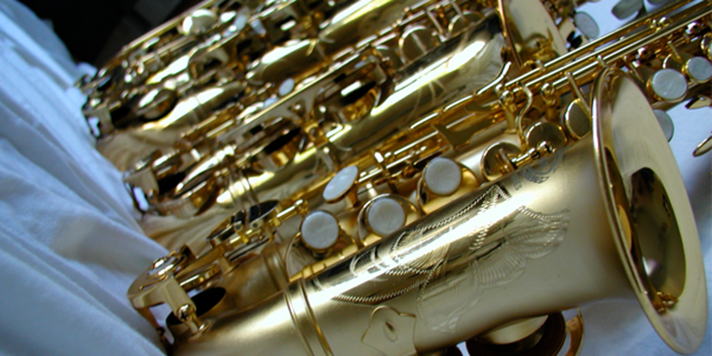This is a guest post from James Barrera, saxophone instructor at Cal State University Long Beach.
Having been involved with younger sax players for well over a decade now, (yes, a few grey hairs have shown up) I think one of the most confusing, and important thing in a high school age musician’s life are their college auditions.
As soon as you make the decision about whether or not you may be interested in pursuing music at a university, begin your research. Unfortunately, there is not as much information exists about Music Schools as Law Schools, Medical Schools, or other areas of study that can be found in the US News and World Report College Guides. Begin your search with your local colleges and expand to out-of-state. Look on the web for audition requirements; most schools break down their requirements into three groups: those that require a classical audition, those that require both classical and jazz, and finally those that only require jazz. This may heavily influence your decision on what schools to apply to.
You can be sure that schools that only want to hear classical will require you to study fundamentals of saxophone performance, and those who only want jazz will require you to focus on the study of improvisation and jazz style. The vast majority of schools will require a classical and jazz audition. Having sat in on many of these types of auditions let me tell you this, we can tell if it’s thrown together. Ah yes, I can see it now, the brand new copy of the Ferling etudes, the barely used Selmer C*, and the box of reeds still in the cellophane wrapper. If it’s a month before your audition and you are just beginning to think about the classical component… well it’s really late. The ideal candidate for college has put in a significant amount of time working on classical saxophone style. (Purity and evenness of tone, clarity of articulation, and rhythmic accuracy.) If you do have time, and you teacher is willing, choose pieces from your state honor band audition requirements, or solo/ensemble list. (See below) If time is short, don’t bother with a sonata or concerto; just go with the 48 Famous Studies by Ferling. These are the international standard for saxophonists and you will definitely be studying these in college.
For the jazz portion you will most likely need to play a couple tunes, blues, various scales, as well as complete some kind of ear training test. Be sure to prepare all Major, Minor (Harmonic), Diminished, Whole Tone, and Chromatic scales. You should to be able to play them at a good clip, sixteenth notes at M.M.=60 would be ideal. When you improvise, make sure you’re improvising. Nobody wants to hear the solo you wrote down and memorized. You won’t fool anybody either, they’ll know if you can play changes or just transcribed a solo off somebody’s album. Have a friend play you chords and then outline them on your sax, and play the appropriate scale that goes with that chord. You may be asked to do this in an audition. Don’t always believe what is posted on schools audition requirements, they may just decide at the last second to ask you to play a scale or exercise not listed. Sometimes a teacher may give you a brief lesson to evaluate how you react to instruction.
Think of two or three questions for the auditioners, it doesn’t matter what you ask, it will demonstrate your interest in attending their school. Finally of all the advice I could give you the most important is this; look like you know what you’re doing. Look and dress the part, shake peoples hand, look them in the eye, speak to them with confidence, in other words… Be a Pro!
Suggested Saxophone Repertoire:
- Scales and Studies for all Saxophones
- Daily Studies for Saxophone, Trent Kynaston, Warner Brothers
- Les Gammes Conjointes Et En Intervalles – J.M. Londeix – Henry Lemoine
- 48 Famous Studies – W. Ferling – Southern
Alto Saxophone
- Concert and Contest Collection for Alto Saxophone – Ed. H. Voxman Rubank
- Solos for the Alto Saxophone Player – Ed. Larry Teal – G. Schirmer
- Sonata No. 3 – G.F. Handel/ arr Rasher – Chappell
- Sonata – H. Eccles/arr. Rasher – Theodore Presser
- Chanson et Passepied – Jeanine Rueff – Alphonse Leduc
- Aria – Eugene Bozza – Leduc
- Tableaux de Provence – Paule Maurice – Henry Lemoine
- 15 Etudes for Saxophone and Piano – Charles Koechlin – Billaudot
- Sonata – Bernhard Heiden – Associated Music Publishers
- Sonata – Paul Creston – Shawnee
- Concerto – Glazunov – Leduc
Tenor Saxophone
- Concert and Contest Collection for Tenor Saxophone – Ed. H. Voxman
- Rubank Solos for the Tenor Saxophone Player – Ed. Larry Teal – D. Schirmer
- Sonatina – William Schmidt – Western International Music
- Suite Rococo – Gretry – Schott/Hal Leonard
Baritone Saxophone
Repertoire for Baritone Saxophone at the High School level is not extensive and what is available is of questionable quality. To be honest you would be better off playing a piece for Alto Saxophone, or a Bassoon or Cello transcription. I always recommend Ferling Etudes.
[template id=”182″]
